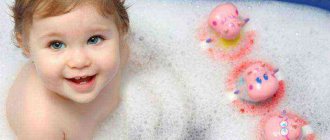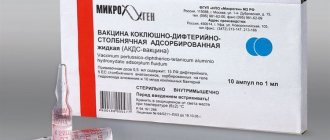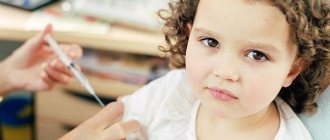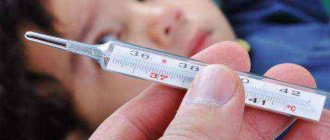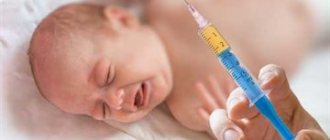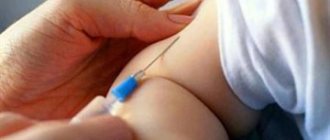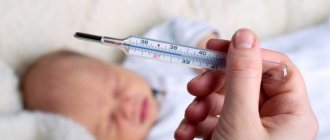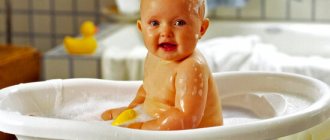Almost from birth, a child undergoes such a mandatory procedure as vaccinations. During the first year of life alone there are more than a dozen of them. The goal is to prevent viral infections. The question arises: is it possible to bathe after vaccination?
There is an opinion among parents, and even among some pediatricians, that it is impossible to bathe the baby directly on the day of vaccination. It must be kept for at least 2 days. However, this point of view has many opponents, including among specialists. Doctors assure that water cannot in any way affect the baby’s condition after vaccination. Let's figure out whether it is possible to bathe a child after vaccination.
Why are children vaccinated?
A vaccination is an injection to improve the child’s immunity and ability to resist various infections. Along with the vaccine, a very small amount of weakly active bacteria and viruses enters the bloodstream, from which the body must protect itself. The child’s immunity is activated, causing a response to the vaccine, which prevents the development of the disease in the body.
Vaccination calendar for children under 1 year of age (in Russia) - what mothers need to know
Why children should not be bathed after vaccination
There are recommendations from experts that it is better to bathe the baby the day before the proposed vaccination, and then refrain from water procedures for 2-3 days. By such actions they want to protect the child from even the most minimal possibility of contracting any infection.
First of all, you need to be guided by the baby’s condition in order to understand whether he can be bathed or not. If your baby has a fever or simply doesn’t feel well after vaccination, it is better not to bathe him. If the child is vigorous, active and cheerful, then there are no special restrictions for swimming after vaccination.
It is believed that children should not be bathed immediately after vaccination, because the body is weakened and it is believed that there is a risk of infection due to water, since running water is a source of pathogenic microorganisms and is not sufficiently purified (in fact, water does not pose any danger to the baby). It is also believed that you can become hypothermic and catch a cold. Therefore, many parents do not bathe their children for 1.5-2 days after the injection.
At first, the body's defenses are indeed slightly weakened. The amount of antibodies produced is not yet sufficient to actively fight infections entering the body. In the first 24 hours after vaccination, children may develop a fever, sore throat, and cough. Swimming can provoke all these negative consequences due to temperature changes.
Due to the fact that the body is weakened, doctors also recommend limiting exposure to fresh air. Immediately after the injection, the likelihood of becoming infected with airborne viruses or accidentally catching a cold increases.
Bathing a child is contraindicated if there are signs of flu or a cold:
- lethargy;
- runny nose;
- cough;
- elevated temperature;
- general deterioration of health.
After vaccination, some children get sick because the immune system is not yet able to fully fight diseases and needs support. Therefore, if a child gets sick, limit the baby’s interaction with other children, reduce or completely eliminate water procedures (except for hand washing) and limit time outside.
Is it possible to bathe a baby after vaccination?
Research has been conducted on this matter. They showed that contact with water after vaccination does not pose any threat to the child’s health. Moreover, hygiene procedures must be carried out. Therefore, you should not completely protect your baby from the usual water treatments - just monitor his well-being and periodically measure his temperature. If the baby feels fine, you can bathe him absolutely calmly.
If your child has a fever, give him a quarter of an analgin tablet or another drug prescribed by your pediatrician. The same thing is sometimes done even in the absence of fever for preventive purposes. But only on the recommendation of a doctor.
Remember - children should not be given aspirin. It contains acetylsalicylic acid; in addition to its anti-inflammatory effect, this substance reduces blood viscosity, which is harmful for a fragile child’s body.
After what vaccinations can a child be bathed?
There are injections, after which there are no prohibitions regarding bathing the child. These are vaccinations against the following diseases:
- polio;
- rabies;
- flu;
- BCG;
- Pneumococcus;
- yellow fever;
- rubella;
- tetanus;
- whooping cough;
- measles;
- DPT;
- viral hepatitis B;
- hemophilus influenzae;
- mumps;
- diphtheria;
- cholera.
You can’t wet Manta - everyone knows this from school. This doesn't mean you shouldn't wash your hands - just don't get the injection site wet. Sweat is also a liquid, so try to avoid making your child sweat a lot. If the Mantoux sample gets wet, it may increase too much, exceeding the permissible norm (read about the Mantoux test).
After a BCG vaccination, a purulent pimple may appear. This is a normal response of the body to this vaccine, so if you notice such a pimple, do not worry. You can bathe your child after this vaccination.
After a DTP injection, slight swelling, swelling or redness of the skin may appear. There is nothing wrong with this either - such a reaction occurs quite often. You can apply a warm water compress to the area to help the swelling go away faster.
From the forums:
When can you bathe a child after DTP vaccination if there is no fever?
- Yes, at least right away
- only on the day of vaccination you can’t, the next day you can
- The next day you can definitely
Is it possible to bathe a child after polio vaccination?
—Only on the day of vaccination you can’t, if you gave an injection, if droplets then you can
“It’s just important not to steam the injection site, that’s why they say you shouldn’t bathe.” But! If the child tolerates vaccinations normally, then the next day it’s definitely possible
— You definitely shouldn’t bathe on the first day, but you can take a COLD shower for a while. if there is no temperature, she feels normal, it means she tolerates it well. even if the temperature rises slightly for a short time, it’s not scary. but for the sake of your own peace of mind, you can limit yourself to rinsing on the second day)
Is it possible to bathe a child after vaccination against measles, rubella, mumps?
- if there is no temperature, then you can
The injection site is wet: what to do
You cannot get the DTP vaccine wet, but if this happens, there is no need to panic. You need to blot the injection site with a towel. Rubbing it is strictly prohibited. Such actions will worsen the situation.
If a local reaction occurs, the affected area is treated with Troxevasin ointment.
The drug helps improve blood circulation and the seal begins to dissolve. The pain syndrome is relieved, itching and inflammation are eliminated.
Compresses cannot be applied to the injection site. It is also prohibited to use antiseptics and traditional medicine. All actions are coordinated with the doctor. Self-medication is unacceptable.
Moms' opinions on bathing after vaccinations
Most mothers advocate water procedures after vaccinations on the same day or, in extreme cases, the next (to be on the safe side, so to speak), considering them safe for the baby’s health. In reviews on the Internet you can read that many of them do not see any danger in the usual rules of personal hygiene and consider even a slight increase in temperature after an injection to be normal. Moreover, some mothers claim that this is an indicator of the correct reaction of the immune system to the vaccine, which means that the baby’s body is developing correctly.
Doctors' opinion
Many therapists and pediatricians advise refraining from water procedures after vaccinations. But now such advice is given by doctors less and less, since there are no negative consequences for the child’s body from contact with water. If you do not bathe children for too long, avoid hypothermia, and immediately wrap them in a towel after bathing procedures, the risk of catching a cold is very small. Doctors recommend not bathing a child after vaccination in order to further prevent and avoid fever, cough and runny nose.
Dr. Komarovsky believes that if the baby feels well after vaccination, then there is no need to introduce restrictions. You can continue to live as usual, go for walks and swim.
Conclusion: swimming after vaccination does not pose any threat to the baby’s health and swimming is possible. The main thing is the baby’s normal body temperature, just monitor his well-being and avoid hypothermia. By following simple precautions, you can continue to carry out water procedures as usual.
Today, medicine gives parents the right to choose: to vaccinate or not to vaccinate their child. Fortunately, the majority are in favor of vaccination, but choose imported vaccines. The degree of tolerability depends on how well the child is prepared for vaccination. It is important to follow all doctor’s recommendations regarding the post-injection period.
Modern parents have the right to agree or refuse vaccinations; their responsibilities include studying information about vaccinations and making the right choice. Actions of parents after vaccination with DPT or Pentaxim
The DTP vaccine is a vaccination against three serious diseases: whooping cough, tetanus and diphtheria. It is this that causes a huge amount of controversy, since it is considered the most reactive. Vaccination is often quite difficult for children to tolerate: the temperature rises, up to 39 degrees, allergic reactions, leg pain and other side effects often occur.
In public clinics, free of charge, the child is given a separate DPT vaccination and is given drops against polio separately. The imported vaccine Pentaxim is designed to protect babies from five diseases at once. These include whooping cough, tetanus, polio, diphtheria and diseases caused by the bacteria Haemophilus influenzae type b. They cause pneumonia and meningitis.
Regardless of the type of injection given, doctors strongly recommend that you follow all of their instructions immediately after vaccination. Especially when it comes to walking and water treatments.
Why can't you go for a walk on the day of vaccination?
From time immemorial, there has been an opinion that it is not recommended to go for a walk after any vaccination. Doctors have different opinions on this matter. Thus, Dr. Komarovsky strongly recommends going out into the fresh air both in summer and winter. Let's consider several points of view on this matter.
Pediatricians say that you can and should go for a walk, but as an insurance policy, it is better to refrain from walking for the first three days after vaccination. At this time, it is better not to go anywhere, to protect your child from communicating with peers.
After vaccination, the body is busy developing immunity against the diseases inoculated into it. There is no need for extra workload and unwanted contacts now. Neglecting these rules can result in a more serious illness. It will not be the vaccine that is to blame, but the mother.
For some time after vaccination with Pentaxim, you cannot attend kindergarten and clubs. In a large group, viruses spread faster, which means a vaccinated baby is much more vulnerable than his friends. If the DTP went without complications, then on the third day you can send the child to a preschool institution.
Walking schedule for a child after DTP
The day after vaccination requires complete abstinence from walking. It is quite possible that a baby, including a newborn, will not have a reaction to the vaccine at all. The ban on walking is due to the fact that a vaccinated child needs to be observed a little. If there is no fever or other side effects, you can go for a walk the next day.
A walk after DTP is carried out in compliance with a special routine:
- Exit in favorable weather: in summer no more than +20 degrees with air humidity 40% or less, in winter up to -10, provided that there is no strong wind outside.
- You can walk for no more than an hour the day after vaccination. The child should not have a fever. Some pediatricians allow the possibility of going out into the fresh air with newborns if the temperature does not rise above 37.5 degrees.
- There is no need to wrap the child up. The baby may sweat, which will negatively affect the injection site. It may become red, slightly swollen and cause discomfort. In addition, there is a risk of artificially raising the baby’s temperature.
- Walks should be calm, with a minimum amount of outdoor games. It is important to avoid playgrounds and refuse to visit shopping centers: all this can provoke unwanted reactions in a newly vaccinated body. It’s also better not to visit at this time.
You can go for a walk after vaccination in both summer and winter, but only if the weather is favorable and the baby is in a good mood
The “weather” in the house is also important. Some time after vaccination, it is necessary to observe the baby, his appetite and mood. The temperature in the rooms should not exceed 22 degrees. It will be good to humidify the air as much as possible. When a child does not want to eat, there is no need to force him. It is better to give more water, compote, fruit juice or other drinks.
Thus, you should not go for a walk immediately after DTP vaccination. It is optimal to go outside after a few days, when the child’s body has recovered and can repel harmful bacteria and viruses as much as possible.
Is it possible to wet the injection site and after how many days is it allowed to bathe the child?
The rules for swimming are quite simple:
- you should not swim on the day of vaccination, as there is a high risk of fever;
- on the second day, if there are no complaints, the child can be washed.
You should not get the injection site wet for 24 hours after the injection. In this regard, any water procedures are contraindicated. If the child is still very young, it is enough to wipe him with wet wipes, avoiding the wound area. You can give your child a full bath already on the second day, provided the baby is feeling well and has no fever.
On the first day after vaccination, it is better not to wet the injection site.
In general, the ban on swimming after vaccination is associated with a careful attitude towards the health of your child. While swimming, it is easy to become hypothermic and get sick, which is extremely undesirable. Here is the answer to the question: “why is it not advisable to bathe a vaccinated person in the first 24 hours?”
Is it possible to bathe a child and walk with him after a polio vaccination?
Normally, the polio vaccine does not cause a reaction. If it was done separately, then there are no restrictions on visiting the street and swimming. The baby feels well, the temperature is normal - you can safely go outside.
In public clinics, it is customary to simultaneously administer the polio vaccine in combination with severe DTP. In this case, a negative reaction may appear specifically to the latest vaccine. The same applies to the case when the baby receives Pentaxim, which includes a complex of 5 weakened bacteria.
Is it allowed to bathe a baby and walk outside after hepatitis vaccination?
The child receives the first vaccination against hepatitis while still in the maternity hospital. The baby is injected with exactly as many weakened viruses as the body can overcome. This is how immunity to hepatitis disease is developed. Revaccination is carried out when the baby is 1 month old.
There are usually no side effects from the hepatitis vaccine, but since every child is different, you should follow the rules of behavior after the hepatitis vaccine.
The child’s body may react differently to the introduction of weakened bacilli: weakness may appear, a low temperature may rise, and the baby will be lethargic and drowsy. Of course, in this case it is better to refuse walks. You should also not bathe on the first day after the vaccine is administered.
Some pediatricians say that in the absence of any signs of illness in the baby, you can bathe and wet the injection site. On the first day, it is better to do this in the shower, and do not rub the wound with a washcloth. After bathing the child, dry with a towel and lightly blot the injection site.
Despite the fact that hepatitis vaccination is quite easily tolerated and gives a reaction in rare cases, children should start walking on the second or third day after vaccination. It is better to avoid places with large crowds of people (playgrounds, shopping centers). Attendance at clubs and sections must be limited for a time.
Walking and swimming are strictly prohibited if:
- the child has a fever and lymph nodes are enlarged;
- rashes appear on the skin, severe itching bothers you;
- The baby complains of nausea.
Fever and poor health of the child after vaccination prohibit walking in the fresh air. Is it possible to walk and wash after vaccination with Prevenar?
Prevenar is a relatively new vaccine aimed at stimulating the immune system to produce antibodies to pneumococcal infection. It causes pneumonia, meningitis, pharyngitis, bronchitis. Vaccination with Prevenar allows you to minimize the risk of contracting these diseases.
The rules of behavior after vaccination with Prevenar do not differ from the rules of behavior after any vaccination. It is possible that parents will choose the reinsurance option and decide to stay at home with the child for a couple of days. This is advisable if the baby has a high fever reaction to the vaccine and general symptoms of malaise. It is important to remember that for children under one and a half years old, a temperature of up to 37 degrees is considered normal, so fresh air in this case will only be beneficial.
Bans on swimming after Prevenar are also not justified. Some doctors explain the ban by the risk of infection by microbes contained in running water through the wound. It has been scientifically proven that this is not the case. After vaccination, children can and should wash themselves, carefully avoiding the injection site.
In any civilized country, mass vaccination of children against various infectious diseases is carried out. Since vaccinations are given to young children, mothers are naturally very worried about how the baby will cope with the procedure. In addition, there are different opinions on how to care for a child after vaccination. Is it possible to lead a normal lifestyle or do some restrictions need to be introduced?
The situation around water procedures is especially uncertain. Let's try to figure out why you can't bathe your child after vaccination?
Behavior in the post-vaccination period - is it possible to wet the rubella vaccine?
The controversy surrounding vaccination has divided people into those who are in favor of vaccinations and those who have become ardent opponents of the procedure.
It is difficult to convince the latter that the risk of dying from a fatal disease is much higher than its side effects. Complications after injection occur in patients who did not follow a number of measures in preparation for or after vaccination. One of the side effects is the penetration of infection into the injection site after water procedures.
Whether or not to swim after a rubella vaccination is decided by the parent after consulting a doctor and monitoring the child’s general well-being.
Is it possible to wet the rubella vaccine?
Water treatments after rubella vaccination are not prohibited. But whether to wash the child immediately after the injection or to abstain for several days - in this matter the main aspect is compliance with a number of conditions and attention to the child’s health on the part of the parents.
If the mother followed the doctor’s recommendations, there is no point in giving up the pleasant procedures that children get used to. Evening bathing can calm a baby upset about vaccination.
Do not rub the injection site, make the water too hot and stay in it for a long time.
Why can't you bathe your child after vaccination?
Why do many doctors and parents do not advise bathing a child after a rubella vaccination?
The ban is due to the following factors:
- Plain water can cause infection in the wound. Many kids scratch it, which becomes a favorable environment for the penetration of pathogenic microorganisms;
- Bathing can overstimulate a child. Overheating of the body of a baby who has suffered some kind of stress during vaccination can make him more restless, and this is an additional burden on the nervous system;
- Swimming in a cool pool and physical procedures involving water after vaccination can significantly weaken the health of a young patient.
The ban on swimming applies to visiting a bathhouse or sauna, since increased thermal exposure will negatively affect the healing of the wound at the injection site. In such establishments, a child can become infected with viruses from sick people, which will also significantly reduce the body’s immune defense and cause complications after vaccination.
How long after you can take a bath after a rubella vaccine?
When it comes to taking a shower, water procedures can be performed the same evening after vaccination. Duration – several minutes.
You should refrain from bathing for a couple of days. The main thing is to focus on the baby’s condition. You can add a decoction of chamomile and string, valerian to the bath.
In the heat, it is difficult to do without hygiene procedures, so if redness appears in the injection area or the temperature rises, instead of a shower, you can limit yourself to wiping with a soft, damp towel.
Other contraindications and restrictions during the post-vaccination period
To ensure that vaccination does not cause side effects, additional precautions must be taken:
- You cannot immediately leave the clinic; it is important to monitor the child’s general condition and, if symptoms of illness occur, consult a doctor;
- You should follow the diet and limit your baby’s consumption of sweets, salty, fatty foods;
- When the temperature rises, you cannot walk with your child.
You should not visit crowded places. It is advisable not to take your baby to kindergarten for a couple of days.
If it is necessary to use antihistamines, it is better to choose Zyrtec, avoiding the use of Suprastin and Tavegil. As an antipyretic drug, you should not give Aspirin to a small patient.
All foods that can cause allergies should be excluded from the child’s menu. These include honey, chocolate, nuts and those to which his body reacts in normal life.
on this topic
About rubella vaccinations for children in the video:
All pediatricians and many mothers agree that you should refrain from bathing after your child is vaccinated against measles for several days. If the little patient is feeling normal, a couple of days after the injection, you can begin your favorite water procedures.
A live vaccine injected into a baby’s fragile body can weaken his immunity for a while. The general condition may resemble the symptoms of a viral disease and manifest itself in the form of fever, malaise and local redness of the wound.
Pathogenic microorganisms can enter the injection area during bathing. If the baby is feeling normal after vaccination against rubella, you can swim, but you should not rub the vaccine injection area and allow the child to become hypothermic.
Source: https://vactsina.com/privivki-i-ukolyi/ot-krasnuhi-mozhno-kupatsya.html
How does the body react to the vaccine?
Any vaccination is stressful for the body, as it has to mobilize its reserves to fight the introduced infectious agent. It is especially difficult for the baby’s immune system, since it is not developed well enough.
The reaction to the vaccine is individual for each child. Some people tolerate the procedure easily; no reaction occurs either immediately after the injection or on the second day. Other children may experience symptoms such as fever and deterioration in health.
But in any case, whether there is a pronounced reaction or not, the baby’s immune system is under severe stress. Therefore, during the adaptation period, it is so important to exclude additional unfavorable factors that can further weaken the body. And this is fraught with the development of serious complications.
Features of vaccination
Before any immunization, every child must undergo an examination by a pediatrician. This will prevent vaccination of a sick patient. The rubella vaccine is administered intramuscularly. For children under 12 months, the injection is placed in the thigh, for patients over 6 years old - in the shoulder or under the shoulder blade. The manipulation is carried out in the treatment room of the district clinic.
Important! The rubella vaccine cannot be given into the gluteal muscle. Subcutaneous fatty tissue is well developed in this area, which will reduce the rate of absorption of the vaccine. There is also the possibility of damage to the sciatic nerve.
Vaccination against rubella should be carried out taking into account the following rules:
- Immunization should be carried out by specially trained medical personnel under aseptic conditions;
- The administration of the rubella vaccine is carried out with a disposable sterile syringe, which has a thin needle with a beveled bevel;
- Before the procedure, the nurse should carefully examine the vaccine product. If the color of the rubella vaccine has changed, the suspension should not be administered;
- The ampoule with the vaccine preparation is treated with an antiseptic and opened immediately before injection;
- The skin on the leg or arm should be treated with a sterile swab, previously soaked in an antiseptic;
- Next, the rubella vaccine is administered, and the injection site is re-treated with an antiseptic.
Swimming after vaccination - pros and cons
Pediatricians do not have a consensus on whether it is possible to bathe a child after vaccination. Many people believe that water procedures can weaken the body even more. After all, in fact, bathing is a hardening procedure, that is, it creates additional stress on the body. And if the child is already weakened by the vaccine, then the additional load can cause complications.
In addition, if after vaccination you bathe a child in very warm water, this can cause a rise in temperature. Steaming the injection site can lead to the formation of a painful infiltrate (compaction) at the injection site.
For these reasons, some pediatricians do not recommend that parents bathe their baby on the day of the procedure and for some time after it.
How many days can you not bathe your child after vaccination? This depends on the type of vaccine given.
After complex vaccinations, for example, DPT (it protects the child from three dangerous infectious diseases at once), it is not recommended to take water procedures for three days.
Similar rules are recommended after vaccination with BCG (vaccine against tuberculosis) and after the diagnostic Mantoux reaction.
There are less strict restrictions after receiving a hepatitis and after receiving a vaccine that prevents polio. After these procedures, you can bathe your baby every other day, of course, provided that there is no negative reaction.
However, there are pediatricians who do not share the above point of view. For example, Dr. Komarovsky believes that if the baby feels well after vaccination, then there is no need to introduce restrictions. You can continue to live according to your usual routine, go for walks, swim, etc.
The only thing the doctor recommends is to limit the child’s contact with people, since his immune system is somewhat weakened. You need to avoid going to kindergarten for 1-2 days after the procedure, choose quiet places for walks (squares, parks), but it’s better not to go to playgrounds and movies just yet. It is advisable to avoid traveling with your child on public transport during rush hour, not going to stores when there are a lot of people there, etc.
If you get wet: possible consequences
Doctors warn parents not to get the injection site wet on the first day. Contact with water increases the risk of a local reaction in the body.
If you wet the affected area, the following changes are observed at the grafting site:
- redness;
- swelling;
- swelling;
- pain;
- rashes;
- compaction formation;
- lameness.
There are pathogenic microorganisms in the water that provoke the onset of the inflammatory process. When they penetrate an open wound, suppuration begins.
To bathe or not to bathe?
But whose opinion is more correct? Parents will have to decide, because no one except the mother feels what will be best for her baby.
Since there is no doubt that the child’s immune system is weakened after vaccination, you still need to take care of the baby. If you decide to bathe, then you need to take care that there are no drafts, and in every possible way avoid hypothermia of the child after taking water procedures. Still, you should avoid taking a bath and bathe your child with a shower.
In addition, the mother needs to carefully monitor the child, and if he feels unwell and his temperature rises, then he should refuse bathing. But if parents don’t want to take risks, then nothing bad will happen if the child goes without a bath for a couple of days.
